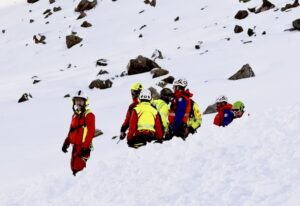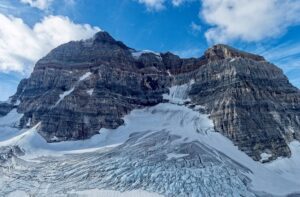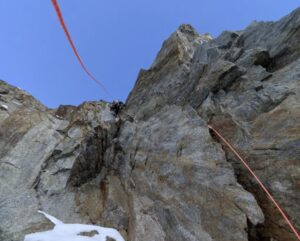Five days ago, there was a difficult, 15-hour rescue of three people on 3,800m Grossglockner in the Austrian Alps.

Grossglockner. Photo: Wikipedia
On Jan. 5, according to Alpin.de, two 40-year-old brothers and their 57-year-old guide arrived at Grossglockner after a long drive from the Czech Republic. Despite snow, low temperatures, strong wind, and a bad weather forecast, they decided to climb the south side of the peak. They began around 6 am, carrying ski touring and climbing equipment.
At 3,500m, the three men could not go any higher, nor could they descend in the bad weather. Around 11 pm that evening, they phoned for rescue. The helicopter couldn’t fly, so 13 rescuers and a local police mountain guide climbed through the night toward the stranded mountaineers.
The next morning, at about 5 am, the rescuers reached a mountain hut. From here, they set off toward the south face of Grossglocckner and eventually reached the trio.
The complicated rescue cost around 20,000 euros, and the public prosecutor’s office is investigating whether the three men will have to pay the cost.
Tourists stuck in flooded Slovenian cave
In southwestern Slovenia, there was another rescue earlier this week, this time in the famous Krizna Jama cave. Five tourists became trapped after sudden flooding, according to Sloveniatimes.com.
On Jan. 6, a Slovenian family of three with two guides entered the cave on a tour. Then water levels suddenly rose because of strong rains in the area, trapping the group. When they didn’t reappear several hours later, a rescue that included cave divers began.

Krizna Jama cave. Photo: Tripadvisor
The group was trapped more than two kilometers into the eight-kilometer-long cave system. They sheltered on a small ledge, ten meters above the water level. On the first day, rescuers reached but could not evacuate them. They gave them food and blankets to survive until the waters receded.
After two days, everyone made it safely out. This was the first incident of its kind in the popular cave.
The Krizna Jama cave lies in Slovenia’s Loz Valley. The karst cave has more than 20 underground lakes, which can be navigated by boat. The cave also features more than 60 different animal species.
A cave bear’s skeleton can be seen there too. Aleksander Skofiz first discovered the bones in 1847, and Ferdinand von Hochstetter started the excavation in 1878. The remains are the richest of its kind in Europe.
Archaeological remains up to five thousand years old add further to the interest. People didn’t live there but used the cave. There are daily guided visits into this popular tourist attraction.





